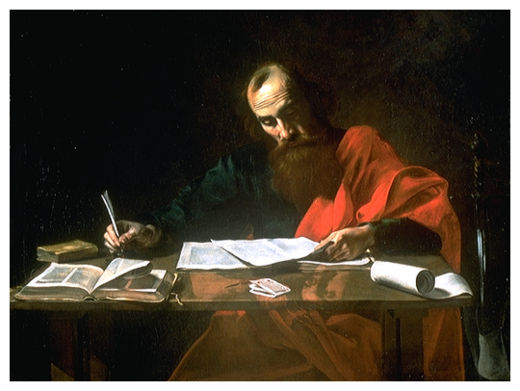
© Mattiasrex / Wikimedia Commons.Paulus skriver sine breve
Næsten halvdelen af det Nye Testamente er et falskneri ifølge en provokativ ny bog som påstår at Paulus kun skrev en brøkdel af de breve han tilskrives og at apostlen Peter slet ikke skrev noget.
Skrevet af Bart Ehrman, en tidligere evangelisk kristen og nu agnostisk professor for religiøse studier ved University of North Carolina, Chapel Hill, hævder bogen at afslører "én af dem mest foruroligende ironier i den tidlige kristen tradition:" brugen af bedrag for at fremme sandheden.
"Biblen indeholder ikke kun usandheder eller tilfældige fejl. Den indeholder også, det som næste all i dag ville kalde løgne, skriver Ehrman i
Forged: Writing in the Name of God -- Why the Bible's Authors Are Not Who We Think They Are.Ifølge bibelforskeren er mindst 11 af de 27 bøger i det Nye Testamente falsknerier, mens kun syv af de 13 breve tilskrevet Paulus er forfattet af ham.
"Virtually all scholars agree that seven of the Pauline letters are authentic: Romans, 1 and 2 Corinthians, Galatians, Philippians, 1 Thessalonians, and Philemon," said Ehrman.
Individuals claiming to be Paul wrote 1 and 2 Timothy, Titus, 2 Thessalonians, Ephesians and Colossians, he added.
Contradictory views, discrepancies in the language and the choice of words among the books attributed to Paul are all evidence of this forgery, the author asserts..
For example, Ehrman's analysis of the book of Ephesians shows that the text, filled with long Greek sentences, doesn't match with Paul's peculiar Greek writing style, made of short sentences.
Moreover, the content of what the author says "stands at odds with Paul's own thought, but is in line with the Ephesians," writes Ehrman.
The biblical scholar, who also challenges the authenticity of the Gospels of Matthew, Mark and John, disputes the assumption that the Apostle Peter wrote the Epistles of Peter or anything else.
Unlike Paul, Peter, a fisherman raised in rural Palestine, was most certainly illiterate. So was the Apostle John, who could have not written the Gospel bearing his name, said Ehrman.
But why would an author claim to be an Apostle when he wasn't? The answer is pretty obvious according to the scholar.
In the early centuries of the church, Christians felt under attack from all sides. "They were in conflict with Jews and pagans over the validity of their religion... but the hottest debates were with other Christians, as they argued over the right thing to believe and the rights ways to live," said Ehrman.
Thus Christians aiming at authorizing views they wanted others to accept, wrote in the name of the Apostles, "fabricating, falsifying, and forging documents," said Ehrman.
"If your name was Jehoshaphat and no one had any idea who you were, you could not very well sign your own name to the book," said Ehrman.
"No one would take the Gospel of Jehoshaphat seriously. If you wanted someone to read it, you called yourself Peter. Or Thomas. Or James. In other words, you lied about who you really were," Ehrman concluded.
According to the scholar, the idea that "writing in the name of another" was a common, accepted practice in antiquity is wrong. Forgery was just as deceitful, inappropriate, and wrong as it is today, he said.
As expected, the book has raised a heated debate.
"The book is more provocative than insightful," writes the
Catholic Herald.Conceding that "some New Testament books probably were not written by the people traditionally assigned as authors," the Catholic website remarks that Ehrman "barely mentions the concept of oral tradition."
"So even if a specific letter was not done by Peter or Paul, it could well have been written by someone drawing from the oral tradition passed down by one or the other," wrote the Catholic website.
Læserkommentarer
dig vores Nyhedsbrev